|
|
|
Sort Order |
|
|
|
Items / Page
|
|
|
|
|
|
|
| Srl | Item |
| 1 |
ID:
084885
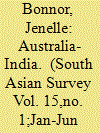

|
|
|
|
|
| Publication |
2008.
|
| Summary/Abstract |
The Australia-India relationship has reached its strongest point for many years, but it is poised at the edge of a difficult issue that may undermine all the hard work. Economic relations are very robust, with Australia's energy supplier role being increasingly important to India. Mutual strategic interests in Asia, the Indian Ocean and counter-terrorism dictate greater focus on the underdeveloped security relationship. But it is the tricky matter of uranium sales that is the big issue in bilateral relations. It has the potential to create a major rupture if a mature accommodation is not reached. Australia and India could develop a stronger and broader partnership that will benefit both but the uranium issue will be a significant challenge to overcome on the way.
|
|
|
|
|
|
|
|
|
|
|
|
|
|
|
|
| 2 |
ID:
084884
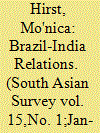

|
|
|
|
|
| Publication |
2008.
|
| Summary/Abstract |
Relations between Brazil and India seem to be blooming recently, favoured by a mix of domestic and international developments. Together with an expanded terrain of common interests in multilateral political and economic matters, both countries share the trend of perceiving bilateralism as a stimulating and useful learning process. Furthermore, they have assumed a leading role in the process of revival of South-South diplomacy in world affairs. Brazil and India have become major actors in recent proposals aimed at simultaneously promoting a renewed configuration of multilateral institutions and innovative inter-state coalition building among developing countries. The India, Brazil, South Africa (IBSA) initiative is part of this strategy. However, time and maturity are still needed to assert that Brazil-India bilateral ties and converging interests will build up as a relevant dimension for each other's international insertion as well as for an effective renewal of South-South relations in the twenty-first century.
|
|
|
|
|
|
|
|
|
|
|
|
|
|
|
|
| 3 |
ID:
084882
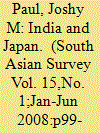

|
|
|
|
|
| Publication |
2008.
|
| Summary/Abstract |
The relationship between Japan and India has been influenced by the international power configuration over time. In the early post-War period, both countries embraced idealistic moor-ings about how the world should be. In due course of time, the United States (US) alliance system put Japan in the western camp of Cold War power politics while India followed a policy of non-alignment. However, with the end of the Cold War and the transformation of Asia into a composite power playground, India and Japan have developed a much closer relationship. The relative decline of America's strategic interest towards the East Asian region and the changing dynamics of security in Asia have forced Japan to search for new partners in Asia, culminat-ing in the present strategic partnership with India. It is in this context that this article probes Indo-Japanese relations by analysing their economic, political and strategic facets.
|
|
|
|
|
|
|
|
|
|
|
|
|
|
|
|
| 4 |
ID:
084876


|
|
|
|
|
| Publication |
2008.
|
| Summary/Abstract |
India is seeking a greater role for itself in the international system. This aspiration is based on the view that India is a stable democracy with significant human and material resources; it is an increasingly important economic power; it has an established record as a responsible and law abiding state; and it has consistently voiced the concerns of the developing countries as a leader of the non-aligned group. Indian foreign policy makers argue that at this stage of 'take off' as a great power India needs to re-invent itself. For this proposed new role India requires new allies and partnerships, including with the dominant superpower, the United States of America (US). The US has stated that it will make India into a great power. What is the US interest in India? How will this new interest and tie-up affect India's traditional partners like Russia? This article seeks to analyse the old model of relations that India enjoyed with Russia. This model is now being given up. Its place is being taken by an Indo-US strategic partnership. How different is this new model strategic relationship in comparison to the Indo-Soviet/Russian relationship? Some of these issues are addressed in this article.
|
|
|
|
|
|
|
|
|
|
|
|
|
|
|
|
| 5 |
ID:
084871
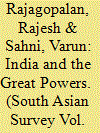

|
|
|
|
|
| Publication |
2008.
|
| Summary/Abstract |
Six propositions drive this article. First, India's relations with the great powers as they evolve over the next two decades are going to be conditioned by India's own emergence as a great power. Second, it will take at least 15 to 20 years for a balance to re-emerge in the contemporary hegemonic system; hence, India's emergence will be simultaneous with the relative decline of the United States (US). Third, Indian policy makers and analysts need to think structurally about India's external relations, especially with the US and China. Fourth, India's relations with the great powers are inseparable from the broader issue of emerging Asian balances and security architectures. Fifth, India needs to keep a keen eye on other major powers, among whom Russia, Japan, the European Union (EU) and Brazil will be particularly important. Finally, while building its capabilities along a broad spectrum, India must not lose sight of the normative component that is inherent in great power status.
|
|
|
|
|
|
|
|
|
|
|
|
|
|
|
|
| 6 |
ID:
084873
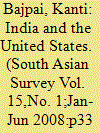

|
|
|
|
|
| Publication |
2008.
|
| Summary/Abstract |
A grand strategic partnership between India and the United States (US) can be constructed at five levels-the planetary, the global, the international, the continental and the regional. The focus, conventionally, is on the last three levels. Planetary and global changes, however, confront both countries with huge challenges. India and the US must find ways to cooperate in dealing with climate change and resource depletion, as also with a revolution in human affairs that promises emancipation but could end in reaction and violence. As two continental-sized, pluralistic democracies, they have unique strengths in building a better world.
|
|
|
|
|
|
|
|
|
|
|
|
|
|
|
|
| 7 |
ID:
084881
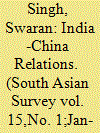

|
|
|
|
|
| Publication |
2008.
|
| Summary/Abstract |
Mutual perceptions and policies of an emerging India and a rising China have increasingly become the focus of public debates around the world. The two countries are seen today as ordained to become major pillars of the international system. The future of India-China relations clearly impinges on the future of Asia, if not the whole world. But in addition to bringing a limited visibility, this public glare has only further complicated their already complex web of problems and potential. The fact that both countries still continue to work together to enhance their mutual understanding holds promise for their future. While their historical baggage continues, continued engagement between China and India remains an imperative for their own survival and for the welfare of their people. In the context of the increasing external influences on their interactions, this article makes an appeal for indigenisation of their mutual explorations and policy formulations.
|
|
|
|
|
|
|
|
|
|
|
|
|
|
|
|
| 8 |
ID:
084883


|
|
|
|
|
| Publication |
2008.
|
| Summary/Abstract |
New Economy cannot be characterised by the high technological applications to production, distribution and consumption alone. Its other salient dimension is South-South economic and political alliances. In the evolving international political economy, a small group of middleincome developing countries are actively challenging established international structures and regimes. While the success of IBSA (India, Brazil, South Africa) as an economic or ideological strategy of the South is far from proven, its impact on South Africa-India relations in particular is tangible. Since South Africa occupies a unique position in Africa, the analysis follows a detailed layout of the South African economy since 1994. This article assesses South Africa's trajectory of economic development by analysing local, regional and global contexts within which the South African economy operates in order to understand the unique position of South Africa on the continent and in the global South. The article also explores the impact of these changing contexts on the South Africa-India bilateral relationship, within and beyond IBSA.
|
|
|
|
|
|
|
|
|
|
|
|
|
|
|
|
| 9 |
ID:
084879


|
|
|
|
|
| Publication |
2008.
|
| Summary/Abstract |
This article brings together the diverse suggestions on the nascent strategic partnership between the European Union (EU) and India. Apart from focusing on popular and policy perceptions, this inquiry undertakes a discursive assessment of key documents defi ning the institutional and ideational frameworks of relations between Brussels and New Delhi. Such narrative analysisallows for innovative tracing of the genealogy, distinct grammars and contradictions of their interactions. Thus, while many of the commentaries on the emerging agency of the EU and India are primarily aimed at making an empirical contribution, this investigation offers a theoretically-informed refl ection on their debates. The contention is that an analytical observation can elicit underlying patterns that tend to remain occluded by the focus on trade fi gures, commercial output or military capabilities.
|
|
|
|
|
|
|
|
|
|
|
|
|
|
|
|
|
|
|
|
|